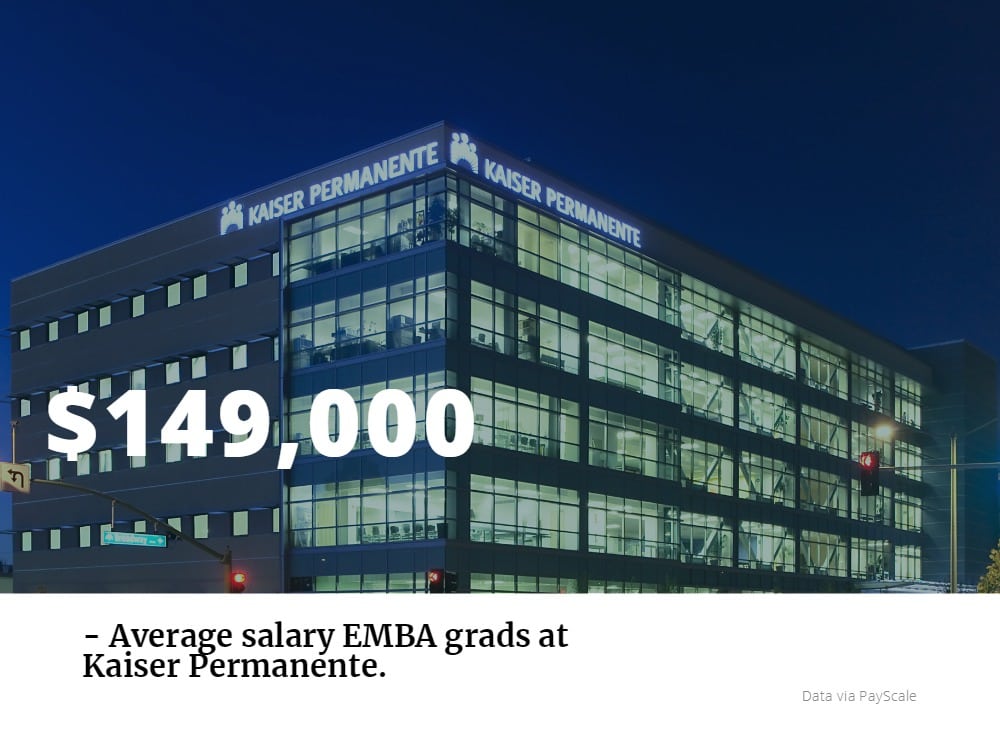Top MBA Recruiters: Kaiser Permanente

Finding a job post-MBA is at once exciting and challenging. There are thousands of new opportunities before you that you’ll have to choose between, and that can leave you feeling overwhelmed. What happens if you choose Career A over Career B? Which employer will offer an MBA graduate the best perks and potential? What industry offers the most job satisfaction?
While there’s no single right answer, there are a few employers that stand out for MBAs. These are companies that actively recruit MBAs and have programs in place to enhance the first job experience. One such top MBA recruiter is Kaiser Permanente.
About Kaiser Permanente
Kaiser Permanente is a consortium of for-profit and not-for-profit healthcare entities based in Oakland, California. Founded in 1945, the company is made up of three distinct interdependent groups: Kaiser Foundation Health Plan, Inc. (KFHP), Kaiser Foundation Hospitals, and Permanente Medical Groups. Currently, Kaiser operates in eight states and one district (Hawaii, Washington, Oregon, California, Colorado, Maryland, Virginia, Georgia, and Washington DC) and is the largest managed healthcare organization in the U.S.
- 11.7 million health plan members
- 208,975 employees
- 21,275 physicians and 54,072 nurses
- 39 medical centers
- 720 medical facilities
- $72.7 billion in revenue
- $3.8 billion in net income
What Is Kaiser Permanente Like for MBAs?
As the largest healthcare organization in the states, Kaiser Permanente has many unique opportunities available for MBA graduates. Not only does the company host internships each summer, but they also offer multiple early career opportunities lasting anywhere from six months to two years in a variety of areas from finance to marketing, sales, and administration.
The great part about choosing Kaiser Permanente as an MBA is that it means you don’t have to choose between a health insurance company and a hospital. Kaiser rolls together health plans, hospitals, and medical groups all in one, allowing MBAs to test their skills in a variety of settings. And hire they do, each year Kaiser hires hundreds of MBAs to fill positions throughout their organization.
As for working at Kaiser, 83 percent of employees say it’s a great place to work offering great challenges (86 percent), great atmosphere (89 percent), and great rewards (88 percent). Some of those rewards include unique benefits and perks such as KP WELL (KP Women Embracing Life and Leadership), which is a program to help women learn, connect, and develop their experience. Kaiser is also known for having a healthy workforce with multiple programs and tools for keeping their employees healthy in mind, body, and spirit.
It’s no wonder that Kaiser ranks 16th overall on the Great Places to Work list of the ‘Best Workplaces in Health Care and Biopharma in 2018,’ and ranked 43rd on the Great Places to Work list of the ‘Best Workplaces for Diversity in 2017.’
Among other benefits of working for Kaiser is a healthy salary. According to PayScale, MBAs can expect to earn around $108,000. However, salary varies based on experience and job with Executive MBAs earning $149,000, and MBAs with focuses in business administration earn $112,000.

Several of the most prominent business schools to offer a healthcare-focused MBA include:
- The Wharton School – Health Care Management MBA
- Columbia Business School – Health and Pharmaceutical Management MBA
- UCLA Anderson – Health Care Management MBA
The Kaiser Permanente Careers Search
MBAs should first consider a summer internship during on the Kaiser Permanente careers search. These internship programs are in a variety of locations, including California, Washington, and Oregon. In particular, MBAs should consider the Business Functions Internship, or Northwest Internship programs.
Both internships last 10 to 12 weeks (typically June through August) with recruiting from January to April. As interns, MBAs work on real-world projects and initiatives, like developing and analyzing financial data, supporting technology initiatives, and conducting market research. Areas of interest for the corporate internships include:
- Finance
- National facilities services
- Human resources
- Internal audit services
- Marketing
- Sales
- Service and administration
Join Kaiser Permanente’s University Talent Network to learn more.
After completing an internship, MBAs can join Kaiser in one of its many early-career opportunities programs. There are multiple programs available including:
- Marketing & Sales Program: One year working on marketing and sales strategy while also undergoing professional development through job shadowing, exposure to leadership, and educational experiences.
- Finance Fellowship Program: This two-year fellowship consists of three rotation assignments and is designed for new graduate candidates interested in a finance career.
- California Administrative Fellowship Program: This 12-or-24-month fellowship consists of two or three rotations at medical centers around Northern or Southern California.
What Does Kaiser Look for in MBA Candidates?
When hiring MBAs for a full-time position or internship opportunity, Kaiser looks for individuals with technical, business, and leadership skills. In particular, candidates with strong leadership, agility, quantitative, and communication skills are highly sought after. For consideration, you need a strong interest in the healthcare industry.
To get started, search for Kaiser Permanente careers here.
Columbia Revisits The Great Recession, and More – New York News

Let’s explore some of the most interesting stories that have emerged from New York business schools this week.
Showing Discipline with Kindness, Compassion to Employees Results in Better Job Performance, Research Shows – Binghamton University School of Management
New Binghamton SOM research reveals that leaders who show “no compassion to employees doesn’t bode well for their job performance, while showing compassion motivated them to be better workers.”
Binghamton Assistant Professor of Management Chou-Yu Tsai and his coauthors “surveyed nearly 1,000 members of the Taiwanese military and almost 200 adults working full-time in the United States” to review the subordinate performance that sprang from Authoritarianism-dominant, Benevolence-dominant, and Classical paternalistic leadership styles.
Tsai explains, “Being benevolent is important because it can change the perception your followers have of you. If you feel that your leader or boss actually cares about you, you may feel more serious about the work you do for them.”
“Subordinates and employees are not tools or machines that you can just use. They are human beings and deserve to be treated with respect. Make sure you are focusing on their well-being and helping them find the support they need, while also being clear about what your expectations and priorities are. This is a work-based version of ‘tough love’ often seen in parent-child relationships.”
You can watch a video on the research below.
A Food Scientist Pursuing a Rutgers MBA Creates Perfect Life Nutrition – Rutgers Business School News
Perfect Life Nutrition founder and current Rutgers Business School MBA Juan Salinas talks about how his path to food science led him to take home the $20,000 top prize at this year’s Rutgers Business Plan Competition.
A native of Honduras, Salinas worked at Nabisco, Cadbury, and Power Bar, where he “combined his expertise in food science with knowledge he gained in sports nutrition working on a master’s offered by the International Olympic Committee.”
He left the corporate ringer in 2015 to start Perfect Life Nutrition and its flagship P-nuff Crunch Baked Peanut Puff, a plant-based protein snack that satisfied Salinas’ desire to make something “tasty and nutritious.”
According to the Rutgers Business School News, Perfect Life Nutrition has since “pushed out two new versions of P-nuff Crunch, both are peanut-based but one is cinnamon-dusted and the other is flavored with cocoa.”
You can read the rest of Salinas’ article with Rutgers Business School here.
Dodd-Frank a Flop: Columbia Business School Study Recommends Fundamental Reforms for Landmark Financial Regulation – Columbia Business School
A decade after the Great Recession hit, new Journal of Applied Corporate Finance research from CBS Professor Charles Calomiris unpacks “numerous flaws in post-crisis financial regulations and proposes modifying or eliminating a number of recently approved financial reforms, including pieces of Dodd-Frank and the Volcker Rule.”

Lehman Brothers’ collapse in 2008 was among the first major signs of massive economic distress – Photo via Oli Scarff/Getty Images
In a recent interview with the school, Calomiris explains, “The Great Recession created a rush in Washington to establish guardrails for the financial industry. But good intentions, expanded powers, and new mandates do not necessarily lead to smart policy decisions.”
“Ten years later, it’s clear that the Dodd-Frank Act and further regulations are failing to curb risky behavior while obstructing economic growth. We can do much better than these costly, unsustainable regulations that will do little to prevent a repeat of the financial crisis.”
Calomiris proposes nearly two-dozen reforms to current regulations, including:
- “Linking financial regulation directly to the performance of the financial sector and demonstrate that regulatory costs are justified by measurable benefits.
- “Restoring the role of laws and formal rule-making in financial regulation and end the discretionary authority of politicized actors like the FSOC and the Consumer Financial Protection Bureau.”
- “Holding regulators accountable to the public by requiring transparent regulatory standards.”
Has Financial Regulations Been a Flop? (or How to Reform Dodd-Frank) can be found here.
What are the Most Successful MBA Startups of 2018?

Earlier this month, LinkedIn released its 2018 list for the Top Startups in the U.S. The list includes 50 of the newest successful startups in the U.S. Most specifically, the list analyzes young companies that are experiencing exceptional employee growth, increasing interest, member engagement, and talent. The social media platform used its network of 575 million members to see which startups commanded the most attention and had the most top talent. To be eligible, startups need to be less than seven years old, have at least 50 employees, and be privately held and headquartered in the U.S.
We decided to take a look at the list and see which of these year’s startups were founded by an MBA. This list is by no means exhaustive, but quickly we were able to find founders and CEOs with MBAs from top universities such as USC Marshall, Wharton, Harvard Business School, and Columbia Business School. Continue reading…
Columbia Business School Dean Hubbard Steps Down After 15 Years

After 15 years, Glenn Hubbard, the dean of Columbia Business School (CBS), has announced he will be stepping down from his position. Columbia University president Lee C. Bollinger made the resignation announcement, which will be effective on June 30, 2019. After that point, Hubbard will resume his faculty role as a professor of finance and economics.
Layoffs, Feeling Connected, and a New Lehigh Grant – New York News

Let’s explore some of the most interesting stories that have emerged from New York business schools this week.
CEOs Paid Less Than Peers More Likely to Engage in Layoffs, Research Finds – Binghamton SOM Blog
According to new Personnel Psychology research coauthored by Binghamton Assistant Professor of Strategy Scott Bentley, “CEOs who are paid less than their peers are four times more likely to engage in layoffs.”
In a recent Binghamton SOM Blog entry, Bentley writes, “In terms of strategic decisions that a CEO can make that could lead to higher pay, layoffs are one of the easiest to do. In a way, CEOs are just like any other type of employee. They are going to compare their pay to those around them. The difference is that the average employee can’t make strategic decisions for the company that influences their own pay. Executives can.”
Bentley adds, “Right around the point where CEOs are paid equal to their peers, the effect kind of goes away. We found that there’s this huge drop off in the likelihood of announcing layoffs once your pay is relatively the same as, or more than, your peers.”
“Payoffs for layoffs? An examination of CEO relative pay and firm performance surrounding layoff announcements” is available here. You can read Bentley’s full article here.
New Research Finds the More Connected You Feel to Your Future Self the Healthier Choices You Make – Columbia Business School
New Columbia Business School research published in the Journal of Experimental Psychology finds that “the more connected you feel to your future self, the more likely you are to adopt healthier habits today, tomorrow and thereafter.”
CBS Assistant Professor of Business Michael Slepian, on the school’s official website, says, “Our findings can help people circumvent the pitfalls of behavioral health changes. What the research shows is, if you can get people to think about their connection to their future selves, you can also get them to visualize the repeated health decisions they will need to make to improve their long-term health.”
According to the article, “it is possible that increasing future self-continuity would not only promote positive healthy behavior like exercising, but also prevent negative behaviors like overeating. The findings of this study could be applied to other behavioral health domains including skincare, such as sunscreen use and tanning salon use, dental care, such as regular flossing and routine dental visits, and road safety, such as texting while driving.”
The paper, “Future Self-Continuity Is Associated With Improved Health and Increases Exercise Behavior,” can be found here.
Philip Rauch’s Legacy Expands Through Family Foundation – Lehigh College of Business and Economics Blog
The Lehigh College of Business and Economics profiled Philip Rauch Jr. ’33, whose Rauch Foundation will “provide a generous grant to establish the Rauch Media and Communications Lab.”

Photo from the original Rauch Business Center groundbreaking on April 7, 1989 / Photo via lehigh.edu
Rauch Foundation President Nancy Rauch Douzinas writes of her uncle Philip’s commitment to Lehigh. “He was especially passionate about the power of clear communications as a means of working together effectively.”
“We know that he would be pleased that the Rauch Foundation will continue to support communications technology at Lehigh and ensure that the school keeps pace with the transformations driving business today.”
Dean Georgette C. Phillips explains it’s Lehigh’s responsibility to ensure that “today’s business professionals become more adept with multimedia and communication tools to communicate or introduce the next best idea.”
According to the school’s blog, “Students and faculty will use state-of-the-art technologies to develop presentations, videos, podcasts and other technologically based communications. Students will benefit from coaching and feedback in real-time with the learning laboratory.”
You can read the full article here.
Coding Becoming a Priority for Columbia Business School MBAs

Like every other elite business school worth its salt, Columbia Business School (CBS) has seen a huge surge in student interest in programming and analytics courses.
It started three years ago when Costis Maglaras, the chair of the Decision, Risk & Operations division of CBS, oversaw development of a new analytics curriculum with the goal to ensure that students were being trained in quantitative, data-driven decision-making.
Maglaras couldn’t help but notice a major gap: There were few courses in computer programming, artificial intelligence, and machine learning.
He took it upon himself to help develop a series of MBA-level programming that included analytics-focused classes to give MBA students the digital tools they needed to become tech-savvy managers. In tandem with Maglaras’ efforts, the student-run Technology Business Group helped develop courses around the programming languages of SQL and Python.
Now more than a dozen elective programming courses have been launched across CBS, helping MBA graduates land management positions at Amazon, Facebook, and Microsoft. And the popularity of these courses is only growing.
“Taking those classes gave me a lot of confidence for my interviews,” says Neha Bansal, MBA ’18. She credits the new curriculum for helping her land a job at Google as a product manager due in small part to her Python expertise.
Bansal is far from the only student who’s reaped the benefits. There are now more than 300 MBA students at CBS who have signed up to learn Python—a highly marketable skill. The only problem: The classes have now become almost too popular.

More than a dozen coding language programs have recently launched for business school students at CBS, thanks in part to the student-run Technology Business Group.
The division hired additional faculty and to figure out how to integrate the new analytics programming more intricately into the overall curriculum. Across the board, CBS is seeing more MBA students interested in programming because, simply put, it’s what employers want.
For example, Citigroup recently announced it would train all incoming analysts in Python. Goldman Sachs has asked its traders to learn how to code. According to a recent Financial Times survey, “understanding digital impact on business” is one of the most important skills for an MBA and one of the most difficult skills to recruit.
“The reality is we’re living in a very data-centric world, and whether we like it or not it’s going to be an important factor in any decision-making process down the road,” Hardeep Johar, of the CBS Engineering School, says. “We need people to be savvy about how to use data analytics and artificial intelligence on all the important decisions of today.”
To read the full article and all about what Columbia Business School is doing to help prepare MBA students to embrace data analytics, visit the CBS website.
